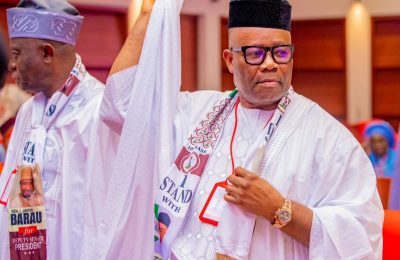Opeyemi Adetola is an international higher education professional and the West Africa regional manager of Colorado State University in the United States. Her work includes empowering futures and enhancing education access. In this interview by Kingsley Alumona, she speaks about her work and higher education issues.
You studied Educational Guidance and Counselling for your undergraduate program. What inspired you to go for education management for your master’s degree?
After a few years of soul-searching, I decided to pursue a master’s degree in Education Management. I wanted to get to the root of how educational institutions operate, how to drive change on a systemic level, and how to build environments where students can thrive.
The degree taught me that education is as much about systems as it is about people. There is a certain beauty in designing educational frameworks that empower both students and educators.
You are the West Africa regional manager of Colorado State University (CSU). What is your role on the job?
Getting the job was more like a winding road of capacity building full of opportunities and “Why not me?” moments. Over the past four to five years, I’ve gained valuable experience in for-profit and non-profit educational organizations, working with universities, students, and education systems across various countries.
My role at CSU is to serve as an advocate for the university in the region. I build relationships and negotiate partnerships with industry partners, high schools, and universities across the region, helping to bridge the gap between CSU and students from West Africa who are seeking high-quality education in the United States. This position allows me to play a pivotal part in shaping the university’s international outreach while making a lasting impact on students’ academic and professional futures, and that is so fulfilling for me.
If a Nigerian interested in getting into CSU contacts you on how to go about it, how would you advise the person?
I would recommend that they begin by selecting a program they are passionate about. CSU has a wide range of options (over 250 courses of study). So, there is something that fits their career goals. Afterwards, they would need to submit their application through the CSU portal, including their transcripts, personal statements, and letters of recommendation.
Next up is securing funding, CSU offers scholarships and other incredible funding opportunities. So, it’s all about being aware. And of course, we’ll work on getting a student visa once they are admitted. Lastly, I would remind them that applying is just the start — CSU is a vibrant community with the best support from the Department of International Enrollment Centre from application to settling in the school.
What necessary foreign examinations would someone interested in studying in the US, say CSU, write?
I always strongly advise that students do their due diligence by checking their departmental website carefully for requirements. Sometimes, requirements differ by department. However, for students in the region, one inevitable test is the English Language Proficiency Test. This could be either TOEFL, IELTS or DUOLINGO. English tests are waived for undergrad applicants from Ghana and Nigeria if they have a minimum of B3 in English in their WASSCE. GRE test results are only demanded by a few departments.
Nigeria is the number one leading source of international higher education students in Africa and number seven in the world, according to the 2024 Open Door Report on International Education Exchange. Is this something worth celebrating or something that should make us question our patriotism and the worth of our higher education system?
I believe this is a development that deserves a nuanced perspective. On one hand, it’s certainly something to celebrate that Nigeria ranks as the leading source of international higher education students in Africa and is the 7th globally. It’s proof of the ambition, resilience, and thirst for quality education among Nigerian students to further their education and build their futures. Consequentially, this raises important questions about the state of our domestic higher education system. While Nigerian students continue to excel abroad, we must reflect on why so many feel the need to study outside the country. Are our local universities offering the level of academic rigor, infrastructure, and opportunities that meet the needs of today’s global job market? We need to ask ourselves whether we are providing enough quality educational resources to retain our brightest minds and future leaders.
In November last year, you moderated a panel organized by The International Education (TINE) with the title ‘Leveraging international education in preparing Africans for the Fourth Industrial Revolution’. What was the major highlight of the panel?
The theme couldn’t have been timelier. The major highlight for me wasn’t just the brilliant insights shared by Boma and Bimpe, but the energy in the room, the collective realization that Africa is not only ready for the Fourth Industrial Revolution but that we are already in it, we need to keep the momentum going.
One moment that stands out was when we discussed the need for a shift in mindset. It’s easy to think of international education as a passport to opportunities abroad. But the real goldmine is in how it equips Africans to become global leaders right here on the continent. From technological advancements to new industries emerging, the message was clear: We need to move beyond the idea of ‘catching up’ and start focusing on how we can lead in shaping the future.
Your LinkedIn bio states that one of your endeavors involves ‘empowering futures.’ What do you mean by this?
My role every day involves helping students break through their limits, step into the unknown, and go after their dreams with everything they have. In my role at Colorado State University, I work with brilliant young people who want more than just a degree, they want to make an impact. My job is to equip them with the tools to do that. From navigating applications to finding scholarships, I’m their academic wingman. And if they need motivation, I’m there, reminding them: “You’re not just applying for a school — you’re signing up for greatness, networks, and a whole new world of possibilities. And, yes, there will be a lot of paperwork, but hey, you’ve got this!”
So, empowering futures isn’t just a slogan for me, it’s my mission. I’m here to turn self-doubt into self-belief, confusion into clarity, and make the whole journey feel like less of a stress test and more of an adventure. Think of me as one who tells you to shoot your shot, even if you miss a few times along the way. Because, hey, even Michael Jordan missed 9,000 shots.
The first sentence of your bio reads: “Opeyemi is building her career with the simple idea that she could have anything in life as long as other people get what they want first.” How is this philosophy working for you?
It’s one of my favourite guiding principles in life. I came up with it during a particularly challenging time in my career. I figured that if I focus on helping others get what they want, whether it’s students finding their dream universities, partners getting the resources they need, or colleagues thriving in their roles, then somehow, my own goals will fall into place. It’s like a cosmic “you scratch my back, I’ll scratch yours,” but with more digital work and fewer actual backs being scratched.
It’s been working like a charm! When I focus on empowering others, I find that opportunities tend to come my way. It’s about creating that positive, give-and-take energy that’s both inspiring and fulfilling.
I apply this philosophy every day in my role at Colorado State University. I’m constantly putting the needs of prospective students first. The more I help them succeed, the more I find that my career grows too. It’s like building a network of awesomeness where everyone wins. And who doesn’t love that?
We are in the New Year. What have you resolved to do better for your, life, work, and Nigeria?
My resolution this year is to commit to deep work. Whether it’s refining my approach to recruitment, understanding the nuances of human potential and where the onus is in fixing the education system in Nigeria. Deep work isn’t just about productivity, it’s about making sure every effort is meaningful and has a ripple effect.
On a personal level, I’m doubling down on the idea of understanding the world around me, from the big issues to the small details. I’m leaning towards conversations that matter, projects that challenge, and experiences that help me grow.
And as for Nigeria this year, I’m more committed than ever to seeing our nation’s full potential uncovered. With all the energy, talent, and untapped resources we have, it’s time for us to stop waiting for change to happen and start being the ones who make it. There’s no more time for passive observation; we have work to do, and I’m ready to contribute in every way I can.
If along the way I pick up a new hobby or two, maybe even learn to swim or do a decent salsa move, that’s just life’s way of reminding me to enjoy the ride. But deep down, this year is about building something more than just success, it’s about building meaning. It’s about digging deeper, working harder, and helping others rise to their fullest potential.
What are the major challenges you face while carrying out your job, and how do you manage them?
Burn-out is a thing. It’s sneaky. There is no shortage of activities, whether it’s signing partnerships in one country, attending recruitment events in another, or organizing initiatives that can keep you hopping from time zone to time zone. It’s like being on a perpetual treadmill of work, travel, and more work. At first, you’re energized by the constant movement, the new partnerships, and the excited students. But after a while, when you’re juggling flights, emails, meetings, and time zones that refuse to cooperate, you start to feel like a one-person circus.
First, I try to remind myself that balance isn’t about doing everything — it’s about managing energy. I’ve learned to listen to my body, and when it says, “Nope, not today,” I honor that. No one is going to thank you for burning out.
Another thing is prioritizing self-care. For instance, while travelling for a partnership meeting in Nairobi, I discovered that running in the early morning made me feel like a superhero. Plus, I also discovered that tea (specifically Kenyan tea) is magical for recharging when I’m on the go.
Then, I live and breathe my calendar. Honestly, without it, I would be a walking blur of missed calls and missed deadlines. I also keep flexible hours when possible. Students can’t be expected to think about applications at 3 am U.S. time, and I can’t expect to operate on Nigerian time while living in Colorado.
READ ALSO: Underprivileged youths, children empowered with education can become successful — Fatoye







